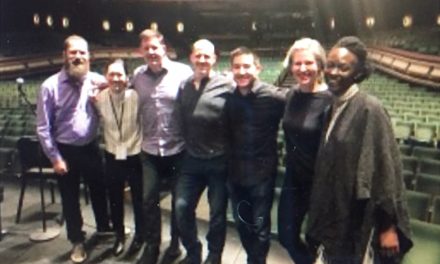By Kelly Oristano
“No one pretends that democracy is perfect or all-wise. Indeed it has been said that democracy is the worst form of Government except for all those other forms that have been tried.” — Winston Churchill, November 1947
It Can’t Happen Here, now onstage at The Very Little Theatre, is a bold and innovative actualization of the political power of community theater. Director Stanley Coleman’s inspired vision for this adaptation of Sinclair Lewis’ 1935 novel is a near-perfect community response to the current political moment. Coleman and his performing and designing collaborators have put something genuine, important, and immediate in the audience’s eyes and ears, and everyone should see it before it is gone.
The experience starts the moment you enter the house. Amy Dunn and Tim Dunn’s beautiful set is symbolic rather than representational. It’s all ramshackle platforms at odd angles and heights festooned with flags and bunting that have molded and faded from stately Red White and Blue to curdled Red Yellow and Blue. Before any actors even have opened their mouths, we know we’re going to be confronted with a story about the hollowness and decay in America.
Lewis’ original novel was a dark fantasy about a Huey Long-type politician ascending to the highest office in the land and letting the worst aspects of his personality run his presidency. In this play, Sen. Buzz Windrip campaigns on crude humor, racism, and outsider bluster. When elected, he governs on fear and brutal partisanship, eventually enforcing martial law to consolidate his power and neuter the opposition, rendering the country he had taken over a complete ruin.
Tony Taccone and Bennet S. Cohen’s very recent adaptation of the novel into a play shifts Windrip from a Huey Long-type to a D*na!d T*#mp-type, and it pulls no punches in explaining why that’s so detrimental to a precariously balanced and permanently imperfect system like American democracy. Windrip spends all of Act One doing the things we’ve already witnessed from Trump: racist, hate-based “populist” campaigning, creation of a violent partisan militia, border closings, upending long-term alliances for personal enrichment and power, etc. At the end of Act One, Windrip declares a fraudulent and semi-permanent martial law, and in Act Two we scream toward the inevitable, violent, destructive conclusion to this decision.
But this is not a play about Senator Buzz Windrip. Like Trump, he’s always in the background, a secondary character at best. The genius of It Can’t Happen Here is that we don’t just watch it all happen newsreel-style, we follow it from the point of view of Doremus Jessup, a Vermont newspaper editor who’s extremely opposed to Windrip, and Jessup’s family, who have varied and changing opinions about Windrip as his career unfolds. In the Jessup family lies the heart and humor that make this play an engaging human story rather than a monster movie.
Patriarch Doremus Jessup is clearly Sinclair Lewis’ stand-in, but he’s so much like so many of us. While Windrip is campaigning, Jessup tells everyone why the campaign can’t ever succeed. He underestimates Windrip and overestimates the civic virtue in the electorate. Jessup’s son Phillip is more pragmatic about it, and therefore has a better read on why Windrip triumphs. For his hubris, the elder Jessup spends time in a labor camp, while son Phillip ends up a (military adjutant) judge. All of Jessup’s children and in-laws have unique reactions to their “interesting times.” It’s a wonderful tactic to blend the small particular story of this family with the huge inescapable weltschmerz of a Windrip/Trump America. Coleman and his cast have dug deep into this duality and the play hits hard and true when family and politics intersect.
Coleman’s cast of 18 is to be commended from top to bottom for their commitment to his challenging vision. There are several different presentational styles in the play, including some very earnest direct address to the audience that never came off as cloying. A number of women appear in “pants roles” (as men) which is affecting and effective. Rebecca Lowe is larger than life as Windrip and Jen Ferro gives Big Evil Genius Energy as Swan, a vindictive judge in Windrip’s kangaroo courts. I was especially taken with Corri Carpenter and Gabrielle Morse as Pascal and Pollikop, local acquaintances who represent the broad arguments of Communism and Socialism respectively with superb charm, humor, and pathos.
The family scenes are among the most impactful in the play, and the performances in and around the Jessup family are considerate and strong. Kizzi van Lake is engaging and fraught with unknowable tension as Mary, a subtle performance that pays off well late in the story. Maggie Hadley is endearing and wise as Lorinda, Doremus Jessup’s “fellow traveler” and longtime friend. Diana Aday is airy and agreeable as his wife Emma, detached from politics until she sees it threaten her family. Sabrina Gross brings real intellect and great comic relief to the nerve-wracking family story as Sissy; her political awakening was one of the most inspiring threads in the evening. And Joel Ibáñez is fantastic as Phillip. His pragmatism-to-a-fault is completely believable and completely devastating.
At the head of the Jessup family table, Russell Dyball has found something next-level. His conception of Doremus Jessup belies a deep connection to the material and encompasses a desperate plea to every single audience member to heed these warnings before we get to Act Two in real life. Jessup’s every incisive witticism in Act One is honed to a razor’s edge and his every look and move in Act Two is the perfect broken man finding his last ounce of resolve at the last possible instant. It’s a mesmerizing and transporting performance that should not be missed.
Underlying everything we see and hear and feel is the firm and uncompromising direction of Stanley Coleman. My date for the evening, a veteran of many an evening at the theater, said It Can’t Happen Here was the first time she’d ever experienced the presence or personality of the director coming through the script and the performances. She was right, it does. Were it not for Coleman, It Can’t Happen Here could have not happened here. And that would have been a crime.
It Can’t Happen Here
When: Evenings at 7:30 p.m. on Oct. 24-26, 31, and Nov. 1-2; matinees at 2 p.m. on Oct. 20 and 27
Where: The Very Little Theatre, 2350 Hilyard St., Eugene
Tickets: $21 for adults, $17 for students and senior citizens, available at the box office, 541-344-7751, or online at TheVLT.com












